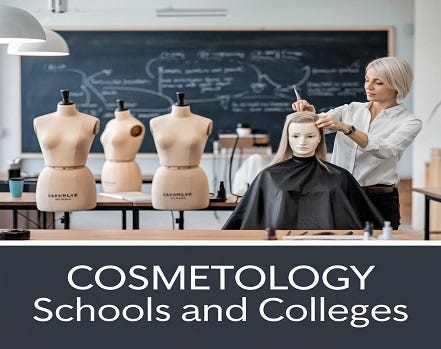Education Insider Magazine | Top Cosmetology Schools and Colleges
 john campbell
john campbell
Introduction
In a world where first impressions often matter, the beauty industry continues to grow at an impressive pace. Behind every successful hairstylist, makeup artist, or skincare specialist is a strong foundation built in a cosmetology school or college. These institutions serve as the training grounds for aspiring beauty professionals, blending creative expression with technical skills and business savvy. But what exactly do these schools offer, and how do they shape the future of the beauty industry?
What is Cosmetology?
Cosmetology is the study and application of beauty treatment. It encompasses a wide range of services including hair styling, coloring, and cutting, skin care, makeup artistry, nail technology, and more. Cosmetologists are trained to enhance a client’s appearance, promote personal confidence, and often provide therapeutic self-care experiences.
Why Attend a Cosmetology School or College?
While a natural flair for beauty and style is a great start, professional training is essential for a successful career in cosmetology. Cosmetology schools and colleges offer:
Hands-On Training: Students gain practical experience with real clients under professional supervision.
Licensing Preparation: Graduates are prepared to pass the required state licensing exams.
Business and Marketing Skills: Many programs include courses in salon management, customer service, and entrepreneurship.
Specialization Opportunities: Students can focus on specific areas like esthetics, barbering, or nail design.
Types of Programs Offered
Cosmetology education can vary depending on the institution and location, but common programs include:
Full Cosmetology Program: Covers hair, skin, nails, and makeup.
Esthetics Program: Focuses on skincare, facials, and makeup.
Barbering Program: Specializes in men’s grooming and hair cutting.
Nail Technician Program: Concentrates on manicures, pedicures, and nail art.
Makeup Artistry: Teaches techniques for beauty, fashion, and theatrical makeup.
These programs typically last from several months to two years, depending on the curriculum and whether the student is attending full-time or part-time.

Choosing the Right School
When selecting a cosmetology school or college, prospective students should consider:
Accreditation: Look for schools accredited by recognized agencies.
State Licensing Requirements: Ensure the curriculum meets state regulations for licensure.
Reputation and Reviews: Research alumni success stories and student feedback.
Facilities and Equipment: Modern, well-equipped facilities can enhance learning.
Financial Aid and Tuition: Compare costs and check for scholarships or federal aid availability.
Career Opportunities After Graduation
Graduating from a cosmetology school opens doors to a variety of career paths, including:
Hair stylist or colorist
Esthetician or skin care specialist
Nail technician
Makeup artist for fashion, film, or bridal services
Salon or spa manager/owner
Beauty brand consultant or educator
According to the U.S. Bureau of Labor Statistics, the beauty industry is projected to grow steadily, with increasing demand for personalized beauty services.
Conclusion
Cosmetology schools and colleges play a vital role in transforming passion into profession. They equip students with the creative, technical, and business skills necessary to thrive in a competitive yet rewarding industry. As trends evolve and the demand for skilled beauty professionals rises, cosmetology education remains a valuable investment in a vibrant, people-centered career.
Subscribe to my newsletter
Read articles from john campbell directly inside your inbox. Subscribe to the newsletter, and don't miss out.
Written by
